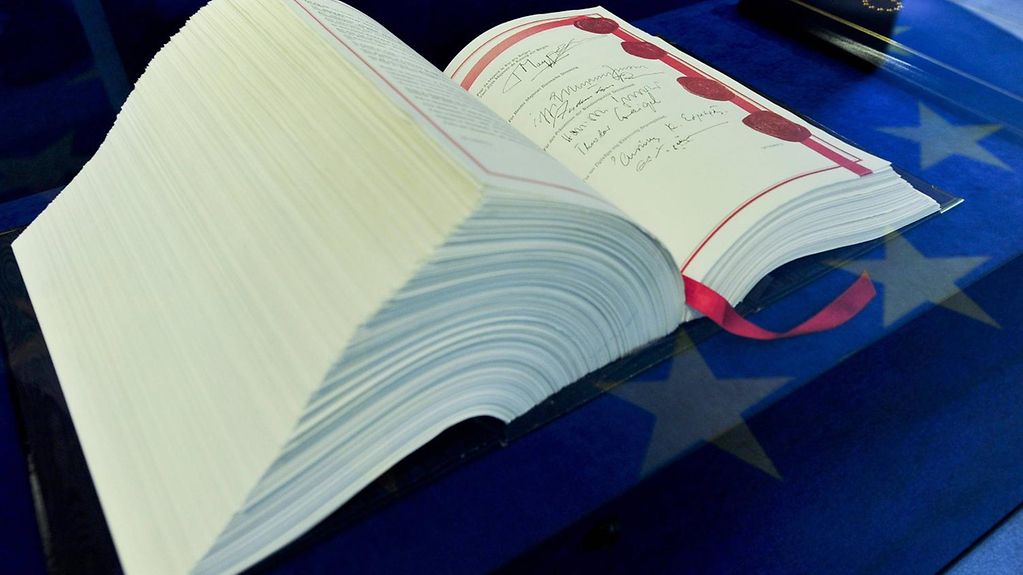The signing of the Maastricht Treaty
On 7 February 1992, the European heads of state and government signed the Treaty on European Union in Maastricht, the Netherlands. What is the subject of this treaty? And how does the treaty benefit the people of Germany? A summary.
3 min reading time

The Maastricht Treaty – a document of outstanding importance in the European unification process.
Photo: imago/Xinhua
It was a historic moment: on 7 February EU leaders signed the Treaty on European Union in Maastricht. For Germany, the document was signed by Finance Minister Theo Waigel and Foreign Minister Hans-Dietrich Genscher. The treaty came into effect on 1 November 1993.
What is the subject of the Maastricht Treaty?
The signing of the treaty was a historic moment in the process of European unification: while economic interests originally determined the central core of the Union, the EU Treaty provided the basis for the European Community to develop into a political union. Members committed themselves not only to economic collaboration but to close political cooperation as well.
The following details were agreed on:
- introduction of European citizenship
- common foreign and security policy
- cooperation in justice and domestic policy
In addition, the EU member states laid the foundations for the common European currency. The euro was introduced in January 2002 and has since facilitated exchange between EU countries. There are no currency exchange charges, and prices can be compared directly across Europe. 20 of the 27 EU member states now make up the Eurozone.
What are the “Maastricht criteria”?
The Maastricht Treaty also sets out the “Maastricht criteria”. These define thresholds for debt, deficit, inflation, exchange rate and interest rates.
All states that have joined or wish to join the euro area must comply with these criteria. For example, annual new debt may not exceed three percent of GNP and total debt may not exceed 60 percent of GNP. Deficit procedures are initiated against member states that do not comply with these criteria, and fines can be imposed as a result.
How does the treaty benefit the people of Germany?
- Free travel, living, working: The Maastricht Treaty introduced citizenship of the Union. This means that all EU citizens are able to move freely within the EU – there are no internal borders and travel is easier. Moreover, there are no barriers to living, working or studying in another EU country and voting in local and European elections there – without having to give up your own nationality. Previously, the right of residence in another EU member state was only granted to EU citizens who were able to prove they had a job in that country.
- Prosperity and jobs: With free trade in the EU, there are no more trade restrictions, tariffs or border controls. As a traditional export nation, Germany benefits greatly from this: almost 30 percent of the country’s jobs depend directly or indirectly on exports – in industry this figure is over 50 percent.
- Uniform minimum standards: Consumers can rely on the same minimum standards of quality, safety and health in all member states due to overarching EU consumer protection rules. For example, ingredients and components must be listed on all food sold in the EU – which greatly benefits allergy sufferers.
- Peace: Never before has there been such a long period of peace in Germany. The institutions of the European Union have contributed significantly to this: countries that cooperate economically do not engage in military conflict.